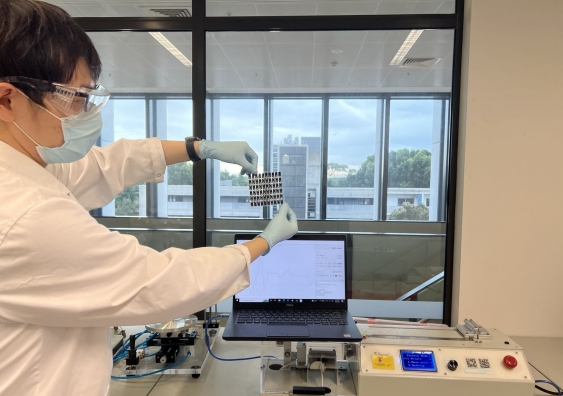UNSW receives $5.5m under new ARC scheme to tackle critical industry challenges
Four projects led by UNSW academics will fund research in quantum computing, urban stormwater reuse, environmental sensing, and fusion energy storage.
Four projects led by UNSW academics will fund research in quantum computing, urban stormwater reuse, environmental sensing, and fusion energy storage.

UNSW Sydney researchers have secured $3.7 million from the Australian Research Council’s (ARC) new Mid-Career Industry Fellowships program, augmented by a further $1.8 million from participating industry partners.��
Four academics from UNSW’s faculties of Engineering and Science will lead projects in the scheme that’s designed to support mid-career researchers to transfer their research skills and knowledge into practical applications to benefit humanity.��
The ARC’s Mid-Career Industry Fellowships scheme will help solve industry-defined challenges harnessing the expertise and skills of researchers from both universities and industry.
UNSW secured four of the seven Fellowships in NSW, and placed second nationally with 16 per cent of the 25 awarded overall.
Professor Nicholas Fisk, Deputy Vice Chancellor, Research and Enterprise, said UNSW’s outstanding success in this first wave funding program validates the University’s prioritisation of working with industry to translate research into tangible outcomes that benefit the Australian society.��
“We’re very proud of these UNSW researchers, who have done exceptionally well with a 26.7 per cent success rate compared with a national rate of only eight per cent. This reflects their exceptional dedication and track record in translating cutting edge research into real world applications. Their research ranges from quantum computing and urban stormwater reuse to environmental sensing and materials for fusion energy,” Prof. Fisk said.
Read more:
Dr Patrick Burr from UNSW Engineering will receive $1,053,296 from the ARC for ‘Life prediction and optimisation of advanced first-wall fusion materials’. The project focuses on accelerating the development of radiation-tolerant materials for fusion energy, in collaboration with HB11 and Tokamak Energy. The fellowship will also enhance Australia’s prominence on the international fusion energy stage.��
Professor Dewei Chu from UNSW Science will receive $1,019,275 from the ARC for ‘Bio-inspired Sustainable Materials for Self-powered Environmental Sensing’. This project aims to address the industry need for self-powered, lightweight and durable Internet of Things (IoT) devices for environmental sensing applications. The key outcome will be a new class of IoT devices with high power density, sustainable output, and real time environmental monitoring capabilities, that will directly benefit Australian industry by providing cost-effective and efficient ways to support safe working environments.��
Dr Bojan Tamburic from UNSW Engineering will receive $865,628 from the ARC for ‘Large scale urban stormwater reuse: safe, clear and odourless water supply’. This project aims to improve the resilience of Australian water supplies by building capacity in urban stormwater reuse and addressing an industry-identified need to determine the suitability of urban lakes and wetlands for stormwater harvesting. This will inform adaptive planning and infrastructure readiness at water utilities, guiding Australian policy on stormwater reuse.��
Dr Kok Chan from UNSW Engineering will receive $764,472 from the ARC for ‘Scalable semiconductor quantum processor with flip chip bonding technology’. Australia is famous for quantum computing research based on electron spin in a silicon quantum dot. This project aims to enable the manufacturing of such scalable quantum processors and will spearhead the country’s semiconductor quantum processors.
ARC Chief Executive Officer, Judi Zielke said the program supports industry-based researchers to partner with a university and university-based researchers to partner with a key industry partner — a company, government entity, or not-for-profit. The aim is to support mid-career researchers from both universities and industry to translate and transfer their research skills and knowledge into real world applications to deliver significant, actionable outcomes for industry partners, end-users, and the Australian community.
“For example, one of the ARC’s fellowships awarded today will build capacity in urban stormwater reuse to future-proof water supplies and reduce the demand on Australia’s river system particularly during drought,” said Ms. Zielke.
More information about the ARC Mid-Career Industry Fellowships is available on the.��